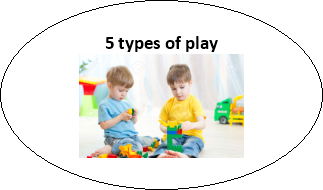Influence of Types of Play on Children
Reflective Account of Child GSA
June 20, 2022Recognition of Types of Abuse and Neglect
June 20, 2022Influence of Types of Play on Children
It is important to understand the different types of play and how they help children’s development in order to plan activities for children. This will help them to develop holistically.
The Early Years Foundation Strategy says that “play underpins all development and learning for young children” (The Early Years Foundation Stage Practice Guidance p1.17 Crown 2008).
Learning through play is a very important principle of Early Years education, staff must provide opportunities for all the types of play:-


 Imaginative Play Construction Play
Imaginative Play Construction Play
Home corner Lego blocks
 Dressing up Building towers
Dressing up Building towers
Small worlds


Physical Play Creative Play
Examples: tricycles, Sensory Play Drawing and
skipping ropes Water and sand play painting, crafts
Children may play in different ways to what you expect, this doesn’t matter, it shows their creativity. They may be running round outside in a superhero costume waving a sword they made out of a cardboard tube (physical + imaginative + creative), this helps them to develop holistically.
Types of play for children ages 2 to 8
Physical
This is any play with a focus which is physical. Children can be playing indoors or outside with balls, ride on toys. They can be climbing, running about or throwing and catching a ball. Physical play helps with motor skills, this gives more confidence. The children interact with each other when they are playing games outside, they learn the rules, how to negotiate, take turns, solve arguments, this helps with social skills.
Resources needed
To help with motor skills and co-ordination you would provide balls of various sizes, ride on toys and trikes, and skipping ropes, hula hoops. Space to play games like hopscotch, tag or football. For 6-8 year olds you could have a basketball hoop, inline skates and bikes.
Example from nursery
In my nursery setting the children play outdoors and there is equipment accessible for them at all times such as scooters. There are only two scooters which gives the opportunity for children to learn how to share and take it in turns to use the scooter. They must communicate with each other in order to ask if they can have a go on the scooter and have to wait their turn to use it, this improves their social skills and language. The scooters help to improve the children’s physical development greatly as the children have to be able to balance and use their legs to be able to move around the area on the scooter. They enhance the children’s gross motor skills. When the children are riding the scooters they can make their own decisions on where they want to go and think for themselves improving their cognitive development.
Development through physical play may be affected if there aren’t enough resources available so children have to wait a long time for a go on a tricycle for example. This can be helped by sending children out in small groups so you have enough things for them to play on.
Imaginative
Children enjoy pretending, it helps them with their speech language and communication skills, their social skills, their identity. There are lots of different types of imaginative play:-
Pretend play – children make an object into something else, a ruler can be a wand for a magician.
Role play – using props, the children play act different roles they are familiar with such as Mummy & Daddy, brothers and sisters, going shopping.

